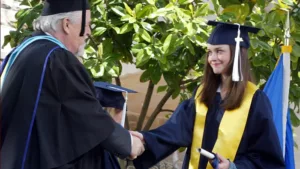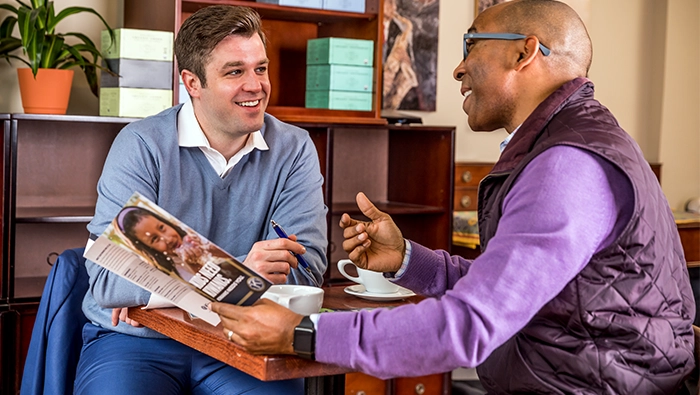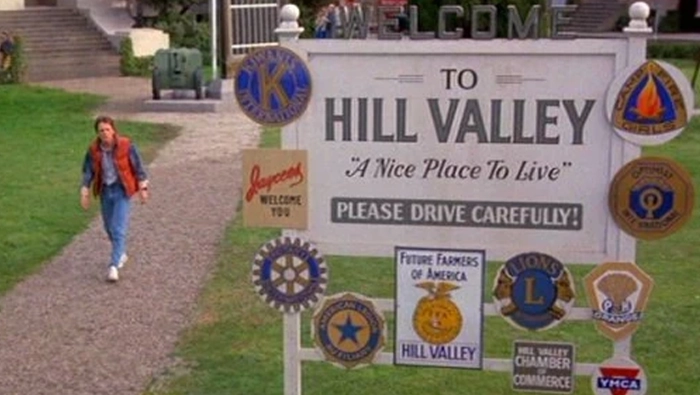Five popular movies and TV shows that have name-checked Kiwanis and Key Club over the years.
By Erin Chandler
Kiwanis International has been serving the children of the world for over a century — and in that time, it has permeated popular culture as well. In movies, TV and written fiction, the presence of a Kiwanis club succinctly tells the audience that the setting is a community that helps out its less fortunate members. Characters might say they are Kiwanians to indicate a dedication to service or a thriving social life. Or they might mention an affiliation with Key Club to indicate that they are high achievers involved in their schools and communities.
Below are five examples of movies and TV shows from the past 40 years that have referenced the Kiwanis family. What is your favorite mention of Kiwanis, Key Club or another Service Leadership Program in popular media?
“Back to the Future” (1985) and “Back to the Future Part II” (1989)
When Marty McFly (Michael J. Fox) travels back to 1955 in the classic film “Back to the Future,” he wanders past a sign welcoming visitors to the fictional town of Hill Valley, California, U.S. — “a nice place to live.” Part of what makes it nice, no doubt, is the plethora of service organizations advertised on the sign, including Rotary International, Lions International, Optimist International and, yes, Kiwanis International. While the Kiwanis logo is absent from the town sign in 1985, it is back when Marty travels forward to 2015 in “Back to the Future Part II.” In a timeline with flying cars, Kiwanis is still serving the children of the world.
“Frasier” (1993-2004)
In season six, episode 19, Niles Crane (David Hyde Pierce) mentions that he was a member of Key Club at his fictional alma mater, Bryce Academy. Niles admits that he initially joined Key Club — along with chess club and drama club — out of a sense of competitiveness with his older brother, Frasier (Kelsey Grammer). However, its principles may have benefited him in the long run — he went on to help others in his profession as a psychiatrist.
“The King of Queens” (1998-2007)
In the first episode, Doug Heffernan’s (Kevin James) father-in-law, Arthur Spooner (Jerry Stiller), moves in with him. When Doug finds out Arthur is planning to invite his Kiwanis club over after numerous hijinks have already disrupted the day, he lays down a series of house rules — including “no parties” and “no Kiwanis.” But Doug shouldn’t worry about Kiwanians in his home: The sitcom’s setting is Queens, New York, U.S., so Arthur is probably a member of the perfectly reputable Kiwanis Club of Lefferts-Liberty, Queens County.

“Gilmore Girls” (2000-2007)
In season three, episode 21, we learn that high school senior Rory Gilmore (Alexis Bledel) has received a US$250 scholarship from a Kiwanis club — possibly the Kiwanis Club of Hartford, Connecticut, U.S., which is the location of Rory’s fictional school, Chilton Academy. It’s no surprise that Rory receives the club’s recognition: She is valedictorian of her graduating class, bound for Yale University and, in her mother’s words, “the most deserving kid ever.”
It’s also possible that Rory’s fictional hometown, Stars Hollow, has its own Kiwanis club — town selectman Jackson Belleville (Jackson Douglas) is on his way to a Kiwanis luncheon in season five, episode five. Considering the town’s packed schedule of themed festivals, the Kiwanis Club of Stars Hollow would undoubtedly be busy with quirky community activities and fundraisers all year long.
“The Flash” (2014-2023)
Key Club prides itself on helping students develop into tomorrow’s leaders. In the universe of “The Flash” TV series, it may have even helped one of them develop into a superhero. When Barry Allen (Grant Gustin) —a.k.a. The Flash— temporarily loses his memory in season three, episode 21, his fiancée, Iris West (Candice Patton), reminds him that he was a member of his high school’s Key Club, along with the science club, astronomy club, anime club and yearbook staff. A true hero, Barry was helping others even before he acquired his super speed.




